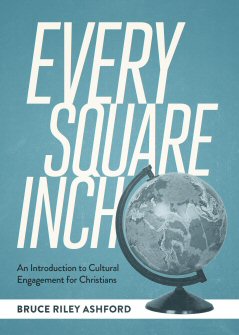
A few weeks ago, Lexham Press announced an exciting partnership with Southeastern Baptist Theological Seminary. Over the next few months, Lexham Press will be publishing three new books in collaboration with SEBTS. The Seminary plans on distributing these books as part of a welcome package to new and prospective students visiting the campus.
The first of these books is written by Bruce Riley Ashford, Provost and Dean of the Faculty at SEBTS. In?Every Square Inch: An Introduction to Cultural Engagement for Christians,?Ashford shows how God wants our whole lives to be shaped by Jesus? lordship. We must remove the barrier between ?sacred? and ?secular,? and allow the gospel to inform everything we do.
Cultural Engagement for the Modern Christian
I had the opportunity to interview Dr. Ashford about his new book and some of his thoughts on cultural engagement in a modern context.
How have your experiences shaped your view toward cultural engagement?
During my college years, I began to experience a nagging desire to understand how my Christianity related to the various courses I was taking such as literature, philosophy, psychology, and biology. These courses were not ?religious? in any obvious way, but I sensed that if Christ created the world and is Lord over it, then somehow he must be related to their subject matter. In effect, I was asking, ?What relationship is there between Christianity and culture??
How has your time overseas changed and honed what it means to be a Christian, not just in an American/Western culture, but elsewhere as well?
Just after college, I moved to Kazan, Russia, where I served as an adjunctive professor for several universities. During those years, I found myself immersed in a cultural context that was a mixture of Eastern European and Central Asian, and which had been shaped in various ways in the past by Sunni Islam and Soviet communism, and more recently by global capitalism and postmodernism. These religious and ideological influences shaped everything in the culture, including the arts, sciences, politics, economic, education, entertainment, family life, and even sports competitions. I found myself wondering what it would look like for me to live a faithfully Christian life in that particular context. So basically, the nagging questions that had bothered me during college were only multiplied during my time in Russia.
In the space of two years in Kazan, I began to realize even more fully the deep and resonant effects of religion upon culture, and vice versa. Russia had been almost entirely devoid of evangelical gospel influence for generations. Conversations with many of my students revealed a deep skepticism about whether or not God exists, whether life has any meaning, and whether there are any moral absolutes. The institutions of this country?including its government, businesses, marriages, and schools?reflected this deep sense of loss, this sense that its people could no longer believe in a God who endowed their lives with meaning and purpose or who gave a moral law by which all people and institutions should abide.
In an attempt to make sense of these questions, I began to read the writings of Abraham Kuyper, Richard John Neuhaus, Lesslie Newbigin, and others. I learned that my Christian belief does in fact ?hold water? in the real world. It helps to make sense of art and science, politics and economics, and business and entrepreneurship. It matters for more than merely my church attendance and personal devotions, as significant as those things are. I realized that, as a Christian, the Lord Christ was calling me to live every aspect of my life in a way that is shaped by his Lordship.
Why is cultural engagement important to Christians today?
It seems to me that many Christians reduce ?cultural engagement? to politics, and reduce political involvement to certain forms of activism. Alongside of this sort of reductionism, Christians often put unrealistic hopes in the political process. In fact, this is a view I had held. But this view is a reductionist and unhelpful understanding of cultural engagement.
While politics is a very significant sphere of culture, it is only one sphere alongside of others, such as art, science, education, and homemaking. As Christians, we should seek to shape all of our activities?artistic, scientific, educational, or political?in light of Christ?s Lordship. We do this primarily as a matter of witness and obedience, but secondarily in the hopes that we can positively influence our society and its cultural institutions. Political activism is a short-term strategy, and is something that we need to do appropriately, but culture-making and cultural engagement represent a long-term strategy that will provide a more fully-orbed and robust witness.
This long-term strategy will involve asking several questions any time we find ourselves making culture or interacting in a particular realm of culture. First, we should ask ?What is God?s creational design for this realm of culture?? Second, ?How has it been corrupted and misdirected by sin and idolatry?? Third, ?In what ways can I help bring redirection to this realm by shaping my activities in light of Christ?s Lordship rather than in submission to idols??
What inspired you to write Every Square Inch?
I wanted to write a short, easily-digestible book that provides a framework for understanding, making, and engaging culture. In the book, I start by building a brief theology of culture and providing a few case studies of exemplary Christians throughout history, Christians such as Augustine of Hippo, Abraham Kuyper, Dorothy Sayers, and Francis Schaeffer.
Then, I spend the rest of the book trying to show how all of life matters to God, how each of us can serve faithfully as a representative of Christ, even as we interact in the arts (music, literature, cinema, architecture, interior d?cor, culinary arts); the natural sciences (biology, physics, chemistry); the social sciences (psychology, sociology); the public square (journalism, politics, economics, law); the academy (schools, universities, seminaries); sports and competition; and homemaking. Every dimension of our lives relates in some way to Christ and can in some manner be directed toward him.
As I wrote in the introduction to the book:
?I write as an American, to other Americans, in our increasingly post-Christian democratic republic. I aim to equip Christians to think holistically about how the gospel informs everything we do in the world. It is my sincere hope that the barrier we have erected in our hearts between ?sacred? and ?secular? will be removed, so that we will awaken?perhaps for the first time?to the reality that Jesus is Lord over all of creation?not only the things we consider sacred, but also the things we consider secular.?
What are you most excited about while working with Lexham Press?
Lexham Press is unique in the publishing world, and I?ve been very happy to work with the Lexham team. One thing I?ve appreciated is that their business model allows them to take a book to press in 3-6 months rather than the usual 12-15 months. Another is that Lexham is able to market the book through its exclusive access to Logos users, something especially helpful for authors whose books are biblically and theologically oriented. Finally, the Lexham team is great. They?re fun to work with and are proficient in directing the publication process to its completion.
You can pre-order the digital edition of Every Square Inch: An Introduction to Cultural Engagement for Christians for over 50% off!
The print edition will be available soon.
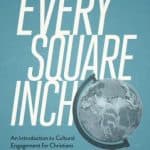

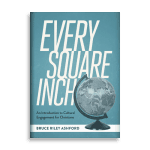
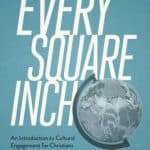
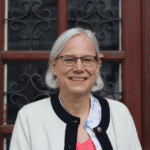
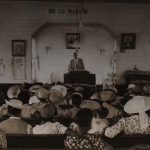

Is there also a printed version coming? I hope so.